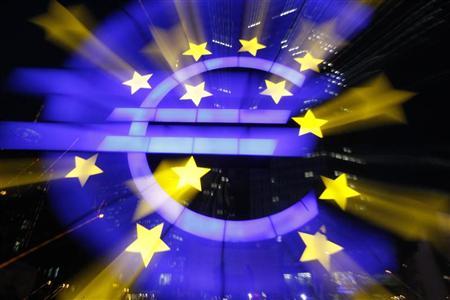(Reuters) – Euro zone finance ministers and the International Monetary Fund will seek to unfreeze the second bailout package for Greece on Monday, but they first need to agree if some of the official loans to Athens might eventually be forgiven to cut Greek debt.

Euro zone ministers and their deputies have held numerous meetings and conference calls over the last two weeks to decide how Greek debt, seen at almost 190 percent of GDP next year, could be cut to a more sustainable 120 percent in 8-10 years.
Without agreement on how to reduce the debt, euro zone ministers and the IMF do not want to resume payments of loan tranches to Athens — even though Greece has met all the conditions — because they have no guarantee on whether the need for emergency financing will ever end.
The key question is: Can Greek debt become sustainable without the euro zone writing off some of the loans to Athens?
So far, the options for debt reduction under consideration include reducing interest on already extended bilateral loans to Greece from the current 150 basis points above financing costs.
How much lower is not yet decided — France and Italy would like to reduce the rate to 30 basis points (bps), while Germany and some other countries insist on a 90 bps margin.
Another option, which could cut Greek debt by almost 17 percent of GDP, is to defer interest payments on loans to Greece from the EFSF, a temporary bailout fund, by 10 years.
The European Central Bank could forego profits on its Greek bond portfolio, bought at a deep discount, cutting the debt pile by a further 4.6 percent by 2020, a document prepared for the ministers’ talks last week showed.
Not all euro zone central banks are prepared to forego their profits, however, the German Bundesbank among them.
Greece could also buy back its privately-held bonds on the market at a deep discount, with gains from the operation depending on the scope and price.
But the preparatory document from last week said that the 120 percent target could not be reached in 2020, only two years later, unless the ministers accept losses on their loans to Athens, provide additional financing or force private creditors into selling Greek debt at a discount.
The latest analysis for the ministers showed the debt could come down to 125 percent of GDP in 2020, one euro zone official with insight into the talks said.
FORGIVING OFFICIAL LOANS?
To cut the debt more boldly, the IMF wants the euro zone to forgive Greece some of the official loans, in what is called Official Sector Involvement (OSI) in EU jargon.
This is an idea that several countries, including Germany, the Netherlands, Finland and Slovakia, firmly reject.
On Monday, the biggest battle is likely to be over just that.
“OSI is at the core of the problems with reaching a deal,” one euro zone official with insight into the talks said.
German central bank governor Jens Weidmann has suggested that Greece could “earn” a reduction in debt it owes to euro zone governments in a few years if it diligently implements all the agreed reforms. The European Commission backs that view.
German paper Welt am Sonntag said on Sunday that euro zone ministers were considering a write-down of official loans for Greece from 2015, but gave no sources and a euro zone official said such an option was never seriously discussed.
European Central Bank executive board member Joerg Asmussen told the German Bild paper on Sunday that a write-down on Greek debt should not be part of the deal, echoing repeated statements from German Finance Minister Wolfgang Schaeuble who said it would be illegal.
“It will be touch-and-go if we get a deal on Greece on Monday,” a senior euro zone official said. “Euro zone countries have made concessions worth a lot of money already, so it is difficult to see how this can move even further.”
French Finance Minister Pierre Moscovici said on Sunday evening that euro zone ministers made big progress to reach a common position during at a conference call on Saturday in preparation for their talks with the IMF on Monday.
“I will go with a firm determination, with a mandate from the president and prime minister, to reach a conclusion,” Moscovici said. “We are very close to a solution.”
Moscovici mentioned the reduction of interest on bilateral loans, foregoing ECB profits on Greek bonds and the debt buy-back as the options that would need to be applied for a deal as well as additional financing for Athens to keep it funded until 2016, rather than only until 2014.
(Additional reporting by Jean-Baptiste Vey in Paris and Erik Kirschbaum in Berlin; Editing by Alex Richardson)





